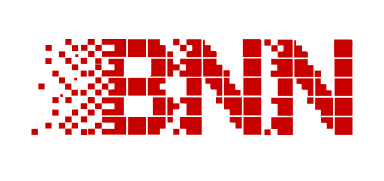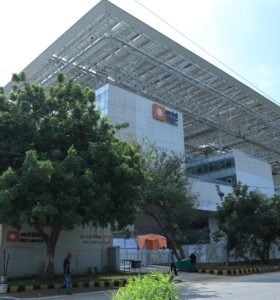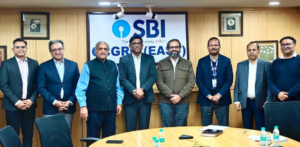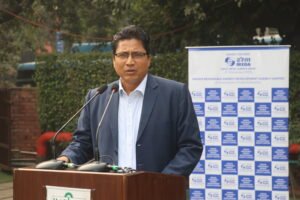Greater Noida (Hridaya Mohan): The recent escalation between Israel and Iran has sent shockwaves across an already volatile world. What was long a shadow war has now erupted into open confrontation, with missile strikes and counter-strikes threatening to destabilize not just the West Asia but globally. What began as a regional confrontation now threatens to engulf global energy markets, disrupt trade flows and destabilize economies already walking a tightrope between inflation and stagnation. For India—a nation deeply intertwined with West Asia through energy, trade and diaspora—the stakes are not just high, they are immediate.
India has deeply invested in both regional stability and economic growth, this conflict presents a complex challenge—one that could reshape trade, energy security and geopolitical alignments in ways we cannot afford to ignore.
A Global Economy on Edge
The Middle East is the world’s economic lifeline, accounting for nearly a third of global oil supply and a critical node in international shipping routes. Any prolonged conflict between Israel and Iran risks disrupting this delicate balance. Oil prices, already hovering around $90 a barrel, could skyrocket if the Strait of Hormuz—a chokepoint for 20% of the world’s oil shipments—becomes a theater of war.
For a recovering global economy, this is the worst possible trigger. Inflation, which had begun to ease in Western economies, could resurge. Global central banks, having only just begun to ease their monetary stance, would be forced to reassess. In the U.S., the Federal Reserve could postpone rate cuts, thereby keeping the dollar strong and emerging market currencies—including the Indian rupee—under pressure. The European Union, already grappling with energy security post-Ukraine, would face renewed uncertainty. China, a key backer of Iran and a major oil importer, may also have to tread carefully in its role as a global economic balancer.
India’s Precarious Position
Strategically, India faces a diplomatic tightrope. It maintains strong ties with Israel – a key defense, cyber security and agri-tech partner – while also engaging Iran – a historically and potential trade partner, vital for energy diversification and connectivity to Central Asia via the Chabahar port. The government’s balancing act has so far been commendable—condemning violence while advocating dialogue. But as the conflict escalates, New Delhi’s neutrality will be tested.
- Energy Security at Risk:
For India, the ripple effects could turn into crashing waves. The country imports over 80% of its oil needs, with a significant chunk coming from the Middle East. A surge in crude prices would batter the rupee, widen the current account deficit and stoke domestic inflation. The government’s fiscal calculations—dependent on stable oil prices—could go awry, forcing tough choices between fuel subsidies and growth investments.
Fuel price hikes would fan inflation across the board, from transport to food. The Reserve Bank of India, which has kept rates steady in recent months, may be forced to hold off on any easing cycle. That, in turn, could delay much-needed investment revival in infrastructure, housing and MSMEs.
- The Spillover Risks:
The volatility would not stop at fuel pumps. Indian equity markets—flush with retail and foreign investments—are highly sensitive to geopolitical risks. A full-scale Israel-Iran war could trigger global risk aversion, leading to FPI outflows, rupee depreciation and sharp corrections in stock indices. Already, gold prices have surged as investors seek safety.
- Trade and Connectivity in Peril:
The Iran-Israel conflict could derail India’s ambitious connectivity projects. The India-Middle East-Europe Economic Corridor (IMEC), envisioned as a rival to China’s Belt and Road, depends on regional stability. Similarly, Chabahar—India’s gateway to Central Asia—could become collateral damage if sanctions on Iran tighten or hostilities spill over.
- Diaspora and Remittance Risks:
Beyond economics, there is a human dimension. The Gulf hosts nearly 9 million Indian workers whose remittances bolster India’s forex reserves. Their remittances—amounting to over $100 billion annually—form a vital pillar of India’s external balance. A wider war could endanger their safety, imperil their livelihoods, the incomes of countless families across India’s heartland and disrupt this vital financial inflow.
Diplomacy Over Escalation
India must act decisively, yet prudently. It must leverage its unique position to advocate for de-escalation. The time for quiet diplomacy is now, before the flames spread further. Multilateral forums like the G20, BRICS and UN should be used to push for restraint.
Simultaneously, New Delhi must accelerate efforts to diversify energy sources, deepen ties with alternative suppliers like Russia and the U.S. and fast-track renewable energy transitions to reduce vulnerability. The country must ramp up energy diplomacy, engage in quiet shuttle diplomacy through multilateral platforms and prepare contingency plans to safeguard trade and diaspora interests.
The Way Forward
In a world already battered by war in Europe and climate disruptions, a fresh conflict in West Asia could be the spark that tips the global economy into a stagflation spiral. For India, neutrality must not mean passivity. It must be a platform for proactive preparedness—diplomatic, economic and humanitarian. The government would do well to work with the RBI to stabilize the currency and reassure markets, while also accelerating alternative energy strategies to reduce future vulnerability.
The world cannot afford another forever war. For India, the stakes are especially high—not just in strategic terms, but for the economic stability that fuels its rise. As West Asia inches closer to the brink, India must brace for impact—not as a distant observer, but as a frontline stakeholder in global peace and economic stability.
About the Author

Mr. Hridaya Mohan (hridayamohan@yahoo.co.in) is a regular Columnist with a renowned Indian daily “The Hitavada”, “Bharat Neeti Media” and some other newspapers / magazines internationally. Superannuated as Executive Director, Steel Authority of India Ltd. (SAIL), he is Senior Adviser, Metallon Holdings Pvt. Ltd. presently. He headed SAIL office at Beijing as Chief Representative (China & Mongolia) for six years. He has published and presented seventeen papers globally. Recipient of “Sir M Visvesvaraya Gold Medal”for one of his papers, “Benchmarking of Maintenance Practices in Steel Industry” from The Institution of Engineers (India), he was awarded with “Scroll of Honour” for the excellent contributions to Engineering fraternity from IE(I), Bhilai, “Jawahar Award” for leadership excellence in SAIL and “Supply Chain Leader – 2017” award from IIMM.









